Evaluaciónes de competencias
Publicaciones
| Publicaciones |
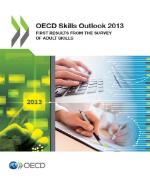 OECD Skills Outlook 2013: First Results from the Survey of Adult Skills
OECD Skills Outlook 2013: First Results from the Survey of Adult Skills
In the wake of the technological revolution that began in the last decades of the 20th century, labour market demand for information-processing and other high-level cognitive and interpersonal skills is growing substantially. The Survey of Adult Skills, a product of the OECD Programme for the International Assessment of Adult Competencies (PIAAC), was designed to provide insights into the availability of some of these key skills in society and how they are used at work and at home. The first survey of its kind, it directly measures proficiency in several information-processing skills – namely literacy, numeracy and problem solving in technology-rich environments. This first edition of the OECD Skills Outlook reports results from the countries and regions that participated in the first round of the Survey of Adult Skills.
• PDF Download / Multilingual summaries
• Skills Outlook
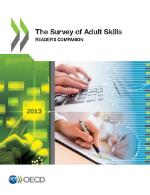 The Survey of Adult Skills - Reader's Companion
The Survey of Adult Skills - Reader's Companion
The technological revolution that began in the last decades of the 20th century has affected nearly every aspect of life in the 21st. Quicker and more efficient transportation and communication services have made it easier for people, goods, services and capital to move around the world, leading to the globalisation of economies. These social and economic transformations have, in turn, changed the demand for skills as well. With manufacturing and certain low-skill tasks increasingly becoming automated, the need for routine cognitive and craft skills is declining, while the demand for information-processing and other high-level cognitive and interpersonal skills is growing. The Survey of Adult Skills, a product of the OECD Programme for the International Assessment of Adult Competencies (PIAAC), was designed to provide insights into the availability of some of these key skills in society and how they are used at work and at home. It directly measures proficiency in several information-processing skills – namely literacy, numeracy and problem solving in technology-rich environments.
• PDF Download
• OECD iLibrary
Skilled for Life? Key Findings from the Survey of Adult Skills 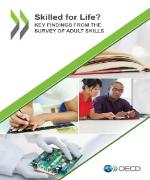
A 32-page brochure presenting the key findings from the Survey of Adult Skills
• PDF Download
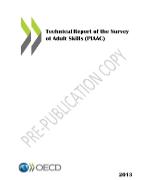 Technical Report of the Survey of Adult Skills (PIAAC)
Technical Report of the Survey of Adult Skills (PIAAC)
This report gives in details the technicalities of the Survey, including: the Assessment and Instrument Design, the Platform Development, the Field Operations and Quality Control, the Sampling and Weighting, the Data Analysis and Data Products.
• PDF Download (full report - NB: Chapter 17 was updated on 1 Sept 2014)
Table of Contents
Foreword
Section 1: Assessment and Instrument Design
Section 2: Platform Development
Section 3: Field Operations and Quality Control
Section 4: Sampling and Weighting
Section 5: Data Analysis and Data Products
Section 6: Appendices
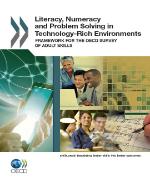 Literacy, Numeracy and Problem Solving in Technology-Rich Environments - Framework for the OECD Survey of Adult Skills
Literacy, Numeracy and Problem Solving in Technology-Rich Environments - Framework for the OECD Survey of Adult Skills
A basic level of literacy and numeracy is essential for full participation in modern societies. While very few people in most of the advanced countries could be regarded as illiterate or innumerate, recent studies have shown that there are, in fact, significant numbers of people with poor skills, and that low levels of skills are associated with lower wages and greater chances of unemployment and disengagement from the labour market.
• PDF Download
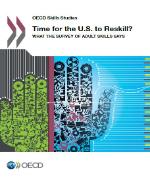 Time for the U.S. to Reskill? What the Survey of Adult Skills Says
Time for the U.S. to Reskill? What the Survey of Adult Skills Says
Literacy and numeracy skills lie at the root of our capacity to communicate, live and work together, to develop and share knowledge. They matter for economic success and social well-being. But despite universal basic education in advanced countries, some adults have slipped through the net, leaving them with weak literacy and numeracy. This report draws on the new international OECD Survey of Adult Skills to highlight the challenges faced by the United States. It shows that the United States should take action to improve adult skills, if it wants to avoid falling behind other countries. The report also advances a set of key recommendations to improve basic skills across the board.
• PDF Download
• OECD iLibrary
| Documentos de la Evaluación de Competencias de Adultos (PIAAC) |
- Este documento presenta la descripción de los niveles de rendimiento en comprensión lectora con sus correspondientes intervalos de puntuación y la descripción de los niveles de rendimiento en matemáticas con los intervalos de puntuación correspondientes.
- Este documento presenta algunos ejemplos de ítems de resolución de problemas, de comprensión lectora y matemáticas (Nivel 2).
(también en chileno, )
- El cuestionario de contexto de la Evaluación de competencias de adultos incluye una variedad de información acerca de los factores que influyen en el desarrollo y mantenimiento de competencias, tales como la educación, el origen social, la interacción con las TICs, el idioma, así como otro tipo de información relacionada con las competencias. La información recoge el estado actual de los encuestados, su situación laboral y sus ingresos. Además, en términos no económicos, la evaluación incluye preguntas sobre el estado de salud, compromiso social, eficacia política y confianza social.
Background Questionnaire – Conceptual Framework
- The current paper provides an overview of the conceptual framework developed for the PIAAC Background Questionnaire and where relevant, includes the items that have been included in the Questionnaire.
Survey of Adult Skills (PIAAC)
- The Programme for International Assessment of Adult Competencies (PIAAC) has established technical standards and guidelines to ensure that the survey design and implementation processes of PIAAC yield high-quality and internationally comparable data. This document provides an introduction to PIAAC and its objectives as well as the methodologies and presents the proposed standards, together with their rationale, technical implications, recommendations for implementation and quality assurance procedures. In addition to the standards and guidelines, the document provides recommendations which are designed to further improve the quality of the survey implementation and results.
- Six examples of items extracted from the Education and Skills online field test, the online version of the Survey of Adult Skills (PIAAC), are included in this document. They are covering different levels of difficulty in the three domains assessed: literacy, numeracy and problem solving in technology rich-environments.
Proficiency levels description
- Besides of presenting key facts about the Survey of Adult Skills, this document provides the detailed explanation of the proficiency levels in the three domains assessed in the Survey: literacy, numeracy and problem solving in technology-rich environments, as well as the corresponding proficiency score.
- Este documento presenta la descripción de las formaciones de capacidades de la evaluacion de la competencias de adultos
PIAAC Problem Solving in Technology-rich Environments: A Conceptual Framework
(EDU Working Paper No.36)
- The current paper provides an overview of the conceptual framework developed for the assessment of problem solving in technology-rich environments for the OECD’s Programme for the International Assessment of Adult Competencies (PIAAC). This covers the specific class of problems that people encounter when using information and communication technologies. These include problems where the existence of the problem is a consequence of the availability of new technologies, where the solution requires the use of computer-based applications or where the problem relates to the management or use of information technologies.
PIAAC Numeracy: A Conceptual Framework
(EDU Working Paper No. 35)
- The current paper provides an overview of the conceptual framework for the assessment of numeracy developed for the OECD’s Programme for the International Assessment of Adult Competencies (PIAAC). This builds on the numeracy framework developed for the Adult Literacy and Life Skills Survey (ALL). Numeracy is broadly defined and complemented with a definition of ‘numerate behaviour’. Four facets of numerate behaviour are identified and described to guide the development of assessment tasks.
PIAAC Literacy: A Conceptual Framework
(EDU Working Paper No. 34)
- The current paper provides an overview of the conceptual framework guiding the development of the assessment of literacy in the OECD’s Programme for the International Assessment of Adult Competencies (PIAAC). It builds upon earlier conceptions of literacy from the International Adult Literacy Survey (IALS) in the 1990s and the Adult Literacy and Life Skills Survey (ALL) in 2003 and 2006 to facilitate an appropriate assessment of the broad range of literacy skills required for the 21st century. The framework broadens the definition of literacy to make it relevant to the information age, in particular, by including the skills of reading in digital environments.
PIAAC Reading Components: A Conceptual Framework
(EDU Working Paper No.33)
- The current paper provides a conceptual framework for the assessment of reading component skills in the OECD’s Programme for the International Assessment of Adult Competencies (PIAAC). The assessment of component skills is intended to provide a greater level of information about the skills of individuals with low levels of literacy proficiency than has been available from previous international assessments. The ‘component skills ’identified for the assessment are vocabulary knowledge, sentence processing and passage comprehension.
| Documentos de trabajo |
Skill Mismatch and Public Policy in OECD Countries
(ECO Working Paper No.1210)
- This paper explores the relationship between skill mismatch and public policies using micro data for 22 OECD countries from the recent OECD Survey of Adult Skills (PIAAC). Results suggest that differences in skill mismatch across countries are related to differences in public policies. After controlling for individual and job characteristics, well-designed product and labour markets and bankruptcy laws that do not overly penalise business failure are associated with lower skill mismatch.
Labour Market Mismatch and Labour Productivity: Evidence from PIAAC Data
(ECO Working Paper No. 1209)
- This paper explores the link between skill and qualification mismatch and labour productivity using cross-country industry data for 19 OECD countries. Utilising mismatch indicators aggregated from micro-data sourced from the recent OECD Survey of Adult Skills (PIAAC), the main results suggest that higher skill and qualification mismatch is associated with lower labour productivity, with over-skilling and under-qualification accounting for most of these impacts. A novel result is that higher skill mismatch is associated with lower labour productivity through a less efficient allocation of resources, presumably because when the share of over-skilled workers is higher, more productive firms find it more difficult to attract skilled labour and gain market shares at the expense of less productive firms. At the same time, a higher share of under-qualified workers is associated with both lower allocative efficiency and within-firm productivity – i.e. a lower ratio of high productivity to low productivity firms. While differences in managerial quality can potentially account for the relationship between mismatch and within-firm productivity, the paper offers some preliminary insights into the policy factors that might explain the link between skill mismatch and resource allocation..
The educational roots of trust
(EDU Working Paper No. 119)
- Trust is important for social and economic well-being, for enhancing social cohesion and strengthening resilience, and for maintaining security and order in our societies. Trust is the foundation upon which social capital is built and it also is intimately related to human capital. This work examines the association between education and levels of interpersonal trust, using data from the OECD’s Survey of Adult Skills (PIAAC). Our analysis demonstrated that education strengthens the cognitive and analytical capacities needed to develop, maintain, and (perhaps) restore trust in both close relationships as well as in anonymous others. It does so both directly, through building and reinforcing literacy and numeracy in individuals, and indirectly, through facilitating habits and reinforcing behaviours such as reading and writing at home and at work. Education and trust are thus fundamentally intertwined and dependent on each other. While all countries across the OECD have been striving to improve their education systems in terms of student achievement levels, this analysis suggests that there are also concrete elements that could be usefully addressed in order to reinforce and strengthen trust.
Skills and labour market performance in Sweden
(ECO Working Paper No. 1233)
- Both educational attainment and skills, as measured in the OECD Survey of Adult Skills (PIAAC), are high in Sweden. They are not perfect substitutes, but both are to some degree necessary for successfully integrating in the Swedish labour market. This paper describes the distribution of proficiency in literacy in the population and explores its determinants, and uncovers a strong relationship between literacy and the likelihood of being employed. The relationship between proficiency in literacy and the likelihood of participating in adult education is also explored. Lower employment prospects for immigrants are well explained by lower literacy proficiency, lower education and less favourable socio-economic backgrounds.
Skills and Wage Inequality: Evidence from PIAAC
(EDU Working Paper No. 114)
- This paper exploits data from the Survey of Adult Skills (PIAAC) to shed light on the link between measured cognitive skills (proficiency), (formal) educational attainment and labour market outcomes. After presenting descriptive statistics on the degree of dispersion in the distributions of proficiency and wages, the paper shows that the cross-country correlation between these two dimensions of inequality is very low and, if anything, negative. As a next step, the paper provides estimates of the impact of both proficiency and formal education at different parts of the distribution of earnings. Formal education is found to have a larger impact on inequality, given that returns to education are in general much higher at the top than at the bottom of the distribution. The profile of returns to proficiency, by contrary, is much flatter. This is consistent with the idea that PIAAC measures rather general skills, while at the top end of the distribution the labour market rewards specialised knowledge that is necessarily acquired through tertiary and graduate education. Finally, a decomposition exercise shows that composition effects are able to explain a very limited amount of the observed cross-country differences in wage inequality. This suggests that economic institutions, by shaping the way personal characteristics are rewarded in the labour market, are the main determinants of wage inequality.
»Read the blog
Comparison of PIAAC and PISA Frameworks for Numeracy and Mathematical Literacy
(EDU Working Paper No.102)
- This paper describes key aspects of the frameworks for the assessment of adult numeracy and mathematical literacy in PIAAC and PISA, which are OECD two flagship programs for international comparative assessment of competencies. The paper examines commonalities and differences in how the constructs of adult numeracy and mathematical literacy were assessed in PIAAC and PISA, and sketches selected challenges associated with interpretation of results from these surveys.
A new measure of skills mismatch: theory and evidence from the Survey of Adult Skills (PIAAC)
(OECD Social, Employment and Migration Working Papers No.153)
-
This paper proposes a new measure of skills mismatch that combines information about skill proficiency, self-reported mismatch and skill use. The theoretical foundations underlying this measure allow identifying minimum and maximum skill requirements for each occupation and to classify workers into three groups, the well-matched, the under-skilled and the over-skilled. The availability of skill use data further permit the computation of the degree of under and over-usage of skills in the economy. The empirical analysis is carried out using the first wave of the OECD Survey of Adult Skills (PIAAC) and the findings are compared across skill domains, labour market status and countries.
Returns to Skills Around the World: Evidence from PIAAC
(EDU Working Paper No.101)
- Existing estimates of the labor-market returns to human capital give a distorted picture of the role of skills across different economies. International comparisons of earnings analyses rely almost exclusively on school attainment measures of human capital, and evidence incorporating direct measures of cognitive skills is mostly restricted to early-career workers in the United States. Analysis of the new PIAAC survey of adult skills over the full lifecycle in 22 countries shows that the focus on early-career earnings leads to underestimating the lifetime returns to skills by about one quarter. On average, a one-standard-deviation increase in numeracy skills is associated with an 18 percent wage increase among prime-age workers. But this masks considerable heterogeneity across countries. Eight countries, including all Nordic countries, have returns between 12 and 15 percent, while six are above 21 percent with the largest return being 28 percent in the United States. Estimates are remarkably robust to different earnings and skill measures, additional controls, and various subgroups. Intriguingly, returns to skills are systematically lower in countries with higher union density, stricter employment protection, and larger public-sector shares.
Ageing and Skills: A Review and Analysis of Skill Gain and Skill Loss Over the Lifespan and Over Time
(EDU Working Paper No.72)
- The relationship between ageing and skills is becoming an important policy issue, not least in the context of population ageing. Data from the Programme for the International Assessment of Adult Competencies (PIAAC) will potentially add considerably to the understanding of the relationship between ageing and foundation skills. In particular, the fact that data from the 1994-1998 International Adult Literacy Survey (IALS) and the 2003-2007 Adult Literacy and Lifeskills Survey (ALL) will be linked with PIAAC offers a unique opportunity to examine trends over time at the cohort level for a wide range of countries. Specifically, repeated measures will enable an analysis of whether there is skill gain and skill loss over the lifespan of cohorts and overtime between cohorts. This is especially important because age-skill profiles observed on the basis of a single cross-section are difficult to interpret. With this as a backdrop, this paper has sought to provide an overview of what is known about age-skill profiles and to conduct an analysis that demonstrates how trend data based on repeated cross-sectional observations of direct measures of skill at the cohort level can be used to estimate skill gain and skill loss over the lifespan and over time.
An Analysis of Skill Mismatch Using Direct Measures of Skills
(EDU Working Paper No.63)
- The focus of this study is on the potential causes of skill mismatch, the extent of skill mismatch, the sociodemographic make-up of skill mismatch, and the consequences of skill mismatch in terms of earnings as well as employer sponsored adult education/training. A distinction is made between skill mismatch and education mismatch. The analysis is based on the 2003-2007 Adult Literacy and Lifeskills Survey (ALLS) – a dataset similar to the one that is forthcoming from the Programme for International Assessment of Adult Competencies (PIAAC) in 2013. These studies contain direct measures of key foundation skills as well as measures of the use of certain generic skills at work which allow for a direct measure of skill mismatch. The analysis points to the complex ways in which mismatch is generated and the need for an accurate and up to date measure of mismatch, one that reflects the possibilities for skill gain and skill loss over the lifespan, and reflects differences in the quality of qualifications.
How Technology Changes Demands for Human Skills
(EDU Working Paper No.45)
- This paper places the competencies to be measured by the OECD’s Programme for the International Assessment of Adult Competencies (PIAAC) in the context of the technological developments which are reshaping the nature of the workplace and work in the 21st century. The largest technological force currently shaping work is the computer. Computers are faster and less expensive than people in performing some workplace tasks and much weaker than people in performing other tasks. On the basis of an understanding of the kinds of work computers do well, it is possible to describe the work that will remain for people in the future, the skills that work requires and the way that computers can assist people in performing that work. The paper argues that a technology-rich workplace requires foundational skills including numeracy and literacy (both to be tested in PIAAC), advanced problem-solving skills or Expert Thinking (similar to the construct of Problem Solving in Technology-Rich Environments to be tested in PIAAC) and advanced communication skills or Complex Communication (not being tested in PIAAC).
International Adult Literacy and Basic Skills Surveys in the OECD Region
(EDU Working Paper No.26)
- Both within and beyond the OECD region, governments and other stakeholders are increasingly interested in the assessments of the skills of their adult populations in order to monitor how well prepared they are for the challenges of the knowledge based society. The current paper provides an overview of the two international assessments of adult literacy which have already taken place in the OECD region – the International Adult Literacy Survey (IALS) and the Adult Literacy and Life Skills Survey (ALL) as well as of the OECD Programme for the International Assessment of Adult Competencies (PIAAC). The conceptual framework for the assessments is described with a focus on the links between the different assessments. In addition, the paper provides a survey of the outputs of IALS and ALL including a review of the major themes addressed in the literature which has used data from these surveys as well as a brief discussion of their policy impact.
» Otros documentos relacionados
Related Documents